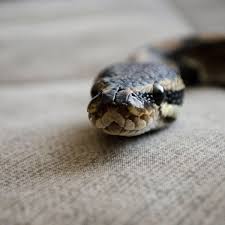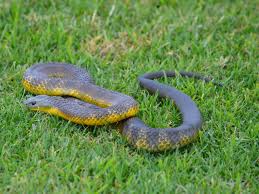Keeping Snakes Away
For many, the sight of a snake in or around the house is the stuff of nightmares. Unfortunately many companies take advantage of people’s fear of snakes to sell products or services that are ineffective, and in some cases they may even recommend the use of products that increase the danger to family members and pets.
First off, the likelihood of a snake showing up on your doorstep depends on several factors, including: your location (north vs. south); surrounding landscape (urban vs. rural); presence of a water source (ponds, lakes, rivers); and your lawn and garden design and maintenance schedule. If you are finding snakes in or around your home, keep calm and follow the tips below:
Do…
Mow grass often and keep it short. Snakes are less likely to hang out and move through short grass because it increases their exposure to predators (e.g., coyotes, hawks). Short grass also makes snakes easier to spot by you and your family members.
Avoid watering your lawn. Watering of your lawn and garden may attract prey species (e.g., worms, slugs, frogs) which may attract snakes seeking a meal.
Keep trees and shrubs trimmed. Trim trees and shrubs away from your home and garage, and keep branches away from the ground. Creating a 24-36″ space under trees and shrubs will reduce snake use and will make snakes easier to spot if present.
Move the bird feeder. Birds are messy eaters and often leave seed scattered below their feeder. Seed on the ground attracts rodents which may attract snakes seeking a meal. Move feeders away from the house or stop feeding altogether. Store bird seed in a metal can with a tight fitting lid.
Install a perch pole. Hawks and owls are natural snake predators that can be attracted to an area with the aid of a well placed perch pole. Poles should be placed in open areas so the hawk or owl has a good view of the yard and surrounding area. Learn more.
Feed pets inside. Feeding pets outside can attract insects and rodents which attracts snakes. If feeding outside is necessary, be sure to cleanup uneaten food right away. Store pet food in a metal can with a tight fitting lid.
Do not…
Do not use mothballs. The active ingredient in mothballs is naphthalene or paradichlorobenzene. These chemicals are toxic to insects and mammals, but are not effective against snakes (San Julian, 1985). Naphthalene may cause illness in humans, and have been linked to death in children. Using mothballs outside your home violates product labels, and puts your family and pets at risk. Do not use mothballs. Here’s a short video showing mothballs are ineffective against snakes.
Do not use sulfur. Many snake-away products claim that sulfur in their products will keep snakes away. Unfortunately sulfur is not effective at deterring snakes and is a waste of money (San Julian, 1985).. Here’s a short video showing ineffectiveness of snake deterring chemicals.
Do not use ceramic eggs or golf balls. If having issues with snakes in your chicken coop, using golf balls, or ceramic, glass or wooden eggs are not the answer. Snakes that eat these artifical eggs die a slow and painful death over many weeks, and new snakes will just show up to take that snake’s place. Instead, focus on improving your coop to prevent snakes from entering and follow the deterrents recommended above. If using ceramic or other artificial eggs to encourage a brooding hen to lay, be sure to glue the eggs down to prevent snakes from eating them. Note: The loss of few chicken eggs here and there is a small price to pay for natural rodent control. Snakes eat lots of rodents, and rodents pose a significant risk to human and livestock health.
Do not release kingsnakes, racers, or other snake predators. Capturing and relocating animals is rarely successful and may even be against the law. Please focus on the deterrents listed above. To learn more about wildlife relocation see (coming soon).
Do not relocate problem snakes. Snake relocation might seem like a good way to reduce human-wildlife conflict, but most research on the topic has found that the snakes die more often than not when relocated.

Simple steps help keep snakes out of your yard
Feed your pets inside. No, snakes don’t like cat or dog food, but rodents do. Feed your pets inside and limit the food for rodents.
• Get rid of debris and leaf piles. Piles of leaves and other lawn debris not only attract rodents, but they also provide protection for snakes, making them a great place for snakes to set up shop.
• Keep your grass cut. This may seem basic, but tall grass provides cover for snakes. Keep it cut and not only is your lawn less desirable to snakes, you can more easily spot them. Your neighbors will appreciate it, too.
• Beware of birdhouses. Everyone likes seeing birds and hearing their young chirp, but these can be an attractant for snakes. Some snakes such as the gray ratsnake are excellent climbers. The gray ratsnake is also one of the most common snakes in Mississippi. Placing a birdhouse on a fence or tree limb is the equivalent of sending a dinner invitation to a ratsnake. Instead, place birdhouses on a metal pole of a wooden post that is wrapped with metal sheeting or has a conical barrier in place.

Most bites occur when people interact with snakes
That snakes were not naturally aggressive and always preferred to retreat. They will only bite humans if cornered, scared, hurt or provoked. Most bites occur when people try to kill or capture snakes”Snakes play an important role in many different types of ecosystems. However, their numbers are generally declining. Having snakes in and around your property means you probably have a healthy ecosystem in place. If you come across a snake in the bush or your yard, just calmly walk the other way.

Important Facts about Venomous and Not Venomous Snakes Which Will Help You Repel Them from Your House
Let’s get better acquainted with the habits of these weird creatures. Our snake fact sheet will help many people stop hating them. It will be useful for those who are not afraid of them as well. It is still better to treat even the most harmless snakes with caution and respect. The following fact sheet is drawn up on the basis of the Louisiana Department of Wildlife and Fisheries specialists’ information.
- Snakes are dangerous for pets. They consume decorative fish, toads and even small kittens.
- Do not lean close to a snake. Snake theoretically cannot jump to the head level of a person, and it is a bite in the face of both venomous and non-venomous snakes that is the most dangerous and even toxic and it can leave a scar on your face. That is why do not to bend down and keep your distance when you try to get rid of them.
- Snakes are useful for farming and gardening. They eat mice, slugs and insect pests. As a rule, it is beneficial to your mini-farm.
- Snakes are season animals. Despite their love for the heat, many snakes become sluggish when it’s hot. They even hibernate in the summer. Similar behavior occurs in the winter. The snakes are most active when breeding (in the spring and beginning of summer) and when it’s simply warm. Another interesting feature of them is that when it’s warm during the day, the crawl into the shade and after some cold period they, on the other hand, they crawl back into the sun. That is why you can often encounter them chilling in the sun of the pavement.
- Snakes are kings of hunger strike. They can easily survive several weeks of famine. They also do well with a smallest piece of prey for a long time. Snakes aren’t the greediest creatures ever.
How to Repel Snakes
Homeowners can take a number of steps to repel snakes from their lawns and gardens. First, try cultural control methods. This basically means, do not make the area immediately around your garden attractive to snakes for living, lounging or snacking. Clear away piles of debris and leaves from your immediate gardening area. Additionally, make sure there are no holes in the exterior walls of your house. Doing both will help keep snakes from residing in your yard, and it might just keep snakes from feeding in your yard.
An extreme measure to keep snakes out of the garden is to fence with hardware cloth, a mesh material, but the fabric must be buried at least four to six feet deep, and must be at least 38 inches tall. Unless you have a serious problem with snakes, this tactic is probably not worth the time and effort it takes.